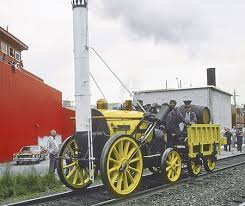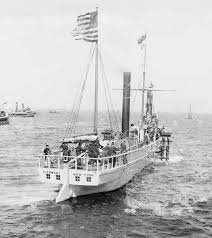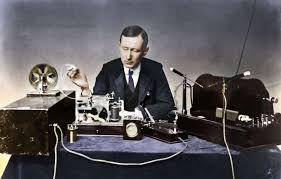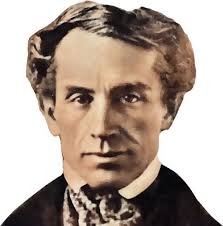stephenson's rocket model
Catagory: History
Author:Rupert Sargent Holland
Posted Date:02/19/2025
Posted By:utopia online
The need of finding a new way of working the coal mines of England, and of marketing the coal, which had been such an important factor in the development of the steam-engine, was a scarcely less important factor in the building of the earliest practical railway locomotive. The coal had to be hauled from the pit of the colliery to the shipping place. It was carried in cars that were pushed or pulled over a rude line of wooden or iron rails. But it was evident from the time when James Watt began to build his steam-engines to lift the coal from the mine that men of inventive minds would soon seek to send the cars over the level ground by the same power. We owe the railroad chiefly to the needs of the north of England, and there we find the real birth of the locomotive.
About the beginning of the nineteenth century a number of men in England were experimenting with new means of locomotion, both for merchandise and for passengers. Their projects varied from cars running on wheels and drawn by horses to carriages propelled by small stationary steam-engines, placed at short distances from each other along the road. In 1802 Richard Trevethick, a captain in a Cornish tin-mine, took out a patent for a steam-carriage. The machine he built looked like an ordinary stage-coach on four wheels. It had one horizontal cylinder, which was placed in the rear of the hind axle, together with the boiler and the furnace-box. The motion of the piston was carried to a separate crank-axle, and that in turn gave the motion to the axle of the driving-wheel. This was in itself a great invention, being the first really successful high-pressure engine that was built on the principle of moving a piston by the elasticity of steam against only the pressure of the air. The steam was admitted from the boiler under the piston that moved in a cylinder, and forced it upward. When the motion had reached its limit, the communication between the piston and the under side of the cylinder was shut off, and the steam escaped into the atmosphere. Then a passage was opened between the boiler and the upper end of the piston, which was consequently pushed downward, and then the steam was again allowed to escape. As a result the power of the engine was equal to the difference between the atmosphere’s pressure and the elastic force of the steam in the boiler.
This steam-carriage of Trevethick was fairly successful, and created a great sensation in that part of Cornwall where it was built. He decided to take it to London, and drove it himself to Plymouth, from which port it was to be carried by sea. On the road it caused amazement and consternation, and won the name of Captain Trevethick’s dragon. He exhibited it in London, but after a short time gave up driving it, believing that the roads of England were too badly built to make the use of a steam-carriage feasible.
Other men were working on similar lines. Among them was the owner of a colliery in the north named Blackett, who built a number of engines for propelling coal-cars and used them at his mines. But these were very clumsy and heavy, moved slowly, and had to be continually repaired at considerable expense, so that other miners, after examining Blackett’s engines, decided they were not worth the cost of manufacture. To make the steam-carriage really serviceable it must be more efficient and reliable.
Meantime a young man named George Stephenson, who was working at a coal mine at Killingworth, seven miles north of Newcastle, was studying out a new plan of locomotive. His father had been a fireman in a colliery at Wylam, a village near Newcastle, and there the son George was born on June 9, 1781. He had lived the life of the other boys of the village, had been a herd-boy to care for a neighbor’s cows, had been a “picker” in the colliery, and separated stones and dross from the coal, had risen to assistant fireman, then fireman, then engineman. He was strong and vigorous, fond of outdoor sports, and also considerable of a student. In time he moved to Willington Quay, a village on the River Tyne, where coal was shipped to London. Here he married, and made his home in a small cottage near the quay. He was in charge of a fixed engine on Willington Ballast Hill that drew the trains of laden coal-cars up the incline.
After he had worked for three years at Willington he was induced to take the position of brakesman of the engine at the West Moor Colliery at Killingworth. He had only been settled in his new place a short time when his wife died, leaving him with a son Robert. Stephenson thenceforth threw himself into his work harder than ever, studying with his son as the boy grew older, and spending a great deal of time over his plans for a steam-engine that should move the coal-cars. He knew the needs of the colliery perfectly, had acquired a good knowledge of mechanics, and proposed to put his knowledge to account.
He had already, as engine-wright of the Killingworth Colliery, applied the surplus power of a pumping steam-engine to the work of drawing coal from the deeper workings of the mine, thereby saving a great amount of manual and horse labor. When the coal was drawn up it had to be transported to the quays along the Tyne, and to simplify this Stephenson laid down inclined planes so that a train of full wagons moving down the incline was able to draw up another train of empty wagons. But this would only work over a short distance, and was in itself a small saving in effort.
The engines that Mr. Blackett had built, using Trevethick’s model as a basis, were working daily near the Killingworth Colliery, and Stephenson frequently went over to see them. He studied Mr. Blackett’s latest locomotive, nicknamed “Black Billy,” with the greatest care, and then told his friend Jonathan Foster that he was convinced that he could build a better engine than Trevethick’s, one that would work more effectively and cheaply and draw a train of cars more steadily.
He also had the advantage of seeing other primitive locomotives that were being tried at different places near Newcastle. One of these, known as Blenkinsop’s Leeds engine, ran on a tramway, and would draw sixteen wagons with a weight of seventy tons at the rate of about three miles an hour. But the Blenkinsop engine was found to be very unsteady, and tore up the tram-rails, and when its boiler blew up the owner decided that the engine was not worth the cost of repair. Stephenson, however, drew some useful points from it, as well as from each of the other models he saw, and proposed to himself to follow Watt’s example in constructing his steam-engine, namely, to combine the plans and discoveries of other inventors in a machine of his own, and so achieve a more complete success.
Stephenson was now very well regarded at the colliery for the improvements he had made there. He brought the matter of building a new “Traveling Engine,” as he called it, to the attention of the lessees of the mine in 1813. Lord Ravensworth, the principal partner, formed a favorable opinion of Stephenson’s plans, and agreed to supply him with the funds necessary to build a locomotive.
With his support Stephenson went to work to choose his tools and workmen. He had to devise and make many of the tools he needed, and to train his men specially for this business. He built his first engine in the workshops at the West Moor Mine. It followed to some extent the model of Blenkinsop’s engine. It had a cylindrical boiler, eight feet long and thirty-four inches in diameter, with an internal flue tube passing through it. The engine had two vertical cylinders and worked the propelling gear with cross-heads and connecting-rods. The power of the two cylinders was carried by means of spur-wheels, which continued the motive power to the wheels that supported the engine on the rails. The engine was simply mounted on a wooden frame that was supported on four wheels. These wheels were smooth, as Stephenson was convinced that smooth wheels would run properly on an edge-rail.
This engine, christened the “Blutcher,” and taking about ten months to build, was tried on the Killingworth Railway on July 25, 1814. It proved to be the most successful working engine that had yet been built, and would pull eight loaded wagons of about thirty tons’ weight up a slight grade at the rate of four miles an hour. For some time it was used daily at the colliery.
But the “Blutcher” was after all a very clumsy machine. The engine had no springs, and its movement was a series of jolts, that injured the rails and shook the machinery apart. The important parts of the machinery were huddled together, and caused friction, and the cog-wheels soon became badly worn. Moreover the engine moved scarcely faster than a horse’s walk, and the expense of running it was very little less than the cost of horse-power. Stephenson saw that he must in some way increase the power of his engine if he was to provide a new motive power for the mines.
In this first engine the steam had been allowed to escape into the air with a loud, hissing noise, which frightened horses and cattle, and was generally regarded as a nuisance. Stephenson thought that if he could carry this steam, after it had done its work in the cylinders, into the chimney by means of a small pipe, and allow it to escape in a vertical direction, its velocity would be added to the smoke from the fire, or the rising current of air in the chimney, and would in that way increase the draught, and as a result the intensity of combustion in the furnace. He tried this experiment, and found his conjecture correct; the blast stimulated combustion, consequently the capability of the boiler to generate steam was greatly increased, and the power of the engine increased in the same proportion. No extra weight was added to the machine. The invention of this steam blast was almost the turning point in the history of the locomotive. Without it the engine would have been too clumsy and slow for practical use, but with it the greatest possibilities of use appeared.
Encouraged by the success of his steam blast Stephenson started to build a second locomotive. In this he planned an entire change in mechanical construction, his principal objects being the use of as few parts as possible, and the most direct possible application of power to the wheels. He took out a patent for this engine on February 28, 1815. This locomotive had two vertical cylinders that communicated directly with each pair of the four wheels that supported the engine, by means of a cross-head and a pair of connecting-rods. “Ball and socket” joints were used to make the union between the ends of the cross-heads where they united with the connecting-rods, and between the rods and the crank-pins attached to each driving-wheel. The mechanical skill of his workmen was not equal to the forging of all the necessary parts as Stephenson had devised them, and he was obliged to make use of substitutes which did not always work smoothly, but he finally succeeded in completing a locomotive which was a vast improvement on all earlier ones, and that was notable for the simple and direct communication between the cylinders and the wheels, and the added power gained by using the waste steam in the steam blast. This second locomotive of Stephenson’s was in the main the model for all those built for a considerable time.
During the time when Stephenson was working on his second locomotive explosions of fire-damp were unusually frequent in the coal mines of Northumberland and Durham, and for a space he turned his attention to the possibility of inventing some pattern of safety-lamp. The result was his perfection of a lamp that would furnish the miners with sufficient light and yet preclude risk of exploding fire-damp. This came to be known as the “Geordie Lamp,” to distinguish it from the “Davy Lamp” that Sir Humphrey Davy was inventing at about the same time. The lamp was used successfully by the miners at Killingworth, and was considered by many as superior to Davy’s lamp. Disputes arose as to which was invented first, and long controversies between scientific societies, most of which sided with the friends of Davy. Stephenson himself stated his claims firmly, but without rancor, and when he saw that it prevented the accidents in mines was satisfied that he had gained his object, and returned to the more absorbing subject of locomotives.
He realized that the road and the rails were almost as important as the engine itself. At that time the railways were laid in the most careless fashion, little attention was paid to the rails’ proper joining, and less to the grades of the roads. Stephenson laid down new rails at Killingworth with “half-lap joints,” or extending over each other for a certain distance at the ends, instead of the “butt joints” that were formerly used. Over these both the coal-cars drawn by horses and his locomotive ran much more smoothly. To increase this smoothness of travel he added a system of spring carriage to his engine, and saved it from the jolting that had handicapped his first model.
The second locomotive was proving so efficient at the Killingworth Colliery that friends of the inventor urged him to look into the possible use of steam in traveling on the common roads. To study this he made an instrument called the dynamometer, which enabled him to calculate the resistance of friction to which carriages would be exposed on railways. His experiments made him doubtful of the possibility of running such railroads, unless a great amount of very expensive tunneling and grading were first done.
All this time George Stephenson continued to study with his son Robert. The boy was employed at the colliery, and was rapidly learning the business under the skilful charge of his father. Stephenson had decided however that Robert should have a better education than had been his, and in 1820 took him from his post as viewer in the West Moor Pit, and sent him to the University of Edinburgh.
News spread slowly in England in that day, and the fact that a steam locomotive was being successfully used at Killingworth attracted very little attention in the rest of the country. Even in the neighborhood of the mines people soon grew used to seeing “Puffing Billy,” as the engine was called, traveling back and forth from the pit to the quay, and took it quite for granted. Here and there scattered scientific men, ever since Watt’s perfection of the steam-engine, had considered the possibility of travel by steam, but practical business men had failed to come forward to build a railway line. At length, however, Edward Pease, of Darlington, planned a road to run from Stockton to Darlington, and set about building it. He had a great deal of difficulty in forming a company to finance it, but he was a man of much perseverance, and at length he succeeded. While he was doing this Stephenson was patiently building new locomotives, and trying to induce the mine-owners along the Tyne to replace their horse-cars with his engines. In 1819 the owners of the Hetton Colliery decided to make this change, and asked Stephenson to take charge of the construction of their line. He obtained the consent of the Killingworth owners, and began work. On November 18, 1822, the Hetton Railway was opened. Its length was about eight miles, and five of Stephenson’s locomotives were working on it, under the direction of his brother Robert. In building this line George Stephenson was thoroughly practical. Although he knew that his name was becoming more and more identified with the locomotive engine, he did not hesitate to use stationary engines wherever he considered that they would be more economical. In the Hetton Railway, which ran for a part of its distance through rough country, he used stationary engines wherever he could not secure grades that would make locomotives practicable. His own steam-engines traveled over this line at the rate of about four miles an hour, and each was able to draw a train of seventeen coal wagons, weighing about sixty-four tons.
The coal mines of the Midlands and the north of England had been the original inducement to inventors to build engines that would draw cars, and the manufacturing needs of Manchester and Liverpool were now gradually inducing promoters to consider building railroads. The growth of Manchester and the towns close to it was tremendous, the cotton traffic between Manchester and Liverpool had jumped to enormous figures, and men felt that some new method of communication must be found. Robert Fulton’s friend, the Duke of Bridgewater, had been of some help with his canal system, but the trade quickly outstripped this service. Then William James, a man of wealth and influence, a large landowner and coal-operator, took up the subject of a Liverpool and Manchester Railway with some business friends, and had a survey of such a line begun. His men met with every possible resistance from the country people, who had no wish to have “Puffing Billys” racing through their fields; bogs had to be crossed and hills leveled; and it soon appeared that the cost of a road would be very expensive. The local authorities gave James and his associates some encouragement, but those members of Parliament he approached were more or less opposed to his plans. The time was not yet quite ripe for the road, but the needs of trade were growing more and more pressing.
Meantime Mr. Pease was again growing eager to build his Darlington and Stockton line. Near the end of the year 1821 two men called at his house. One introduced himself as Nicholas Wood, viewer at Killingworth, and then presented his companion, George Stephenson, of the same place. Stephenson had letters to Mr. Pease, and after a talk with him, persuaded him to go to the Killingworth Colliery and see his locomotives. Pease was much impressed with the engines he saw there, and even more with Stephenson’s ability as a practical engineer. The upshot of the matter was that Pease reported the results of his visit to the directors of his company, and they authorized him to secure Stephenson’s services in surveying the line they wished to build. He took up the work, made careful surveys and reports, and was finally directed to build a railway according to his own plans. This he did, working with the best corps of assistants and the most efficient materials he could find. When the line was nearly completed he made a tour of inspection over it with his son and a young man named John Dixon. Dixon later recalled that Stephenson said to the two as they came to the end of their trip, “Now, lads, I will tell you that I think you will live to see the day, though I may not live so long, when railways will come to supersede almost all other methods of conveyance in this country—when mail coaches will go by railway, and railroads will become the Great Highway for the king and all his subjects. The time is coming when it will be cheaper for a working man to travel on a railway than to walk on foot. I know there are great and almost insurmountable difficulties that will have to be encountered; but what I have said will come to pass as sure as we live.”
In spite of the powerful opposition that the company encountered, and the threats of the road trustees and others, the Stockton and Darlington line was opened for travel on September 27, 1825. A great concourse of people had gathered to see the opening of this first public railway. Everything went well. Stephenson himself drove the engine, and the train consisted of six wagons, loaded with coal and flour, then a special passenger coach, filled with the directors and their friends, then twenty-one wagons temporarily fitted with seats for passengers, and then six wagons of coal, making thirty-four carriages in all. A contemporary writer says, “The signal being given the engine started off with this immense train of carriages; and such was its velocity, that in some parts the speed was frequently twelve miles an hour; and at that time the number of passengers was counted to be four hundred and fifty, which, together with the coals, merchandise, and carriages, would amount to near ninety tons. The engine, with its load, arrived at Darlington, a distance of eight and three-quarter miles, in sixty-five minutes. The six wagons loaded with coals, intended for Darlington, were then left behind; and, obtaining a fresh supply of water and arranging the procession to accommodate a band of music, and numerous passengers from Darlington, the engine set off again, and arrived at Stockton in three hours and seven minutes, including stoppages, the distance being nearly twelve miles.” By the time the train reached Stockton there were about six hundred people riding in the cars or hanging on to them, and the train traveled on a steady average of four to six miles an hour from Darlington.
This road was primarily built to transport freight, and passengers were in reality an afterthought. But the directors decided to try a passenger coach, and accordingly Stephenson built one. It was an uncouth carriage, looking something like a caravan used at a country fair. The doors were at the ends, a row of seats ran along each side of the interior, and a long deal table extended down the centre. Stephenson called this coach the “Experiment,” and in a short time it had become the most popular means of travel between Stockton and Darlington.
With the Stockton and Darlington Railway an assured and successful fact, the men who had been interested in building a line between Liverpool and Manchester earlier took up the subject again. Some improvement in the means of communication between the two cities was more needed than ever. The three canals and the turnpike road were often so crowded that traffic was held up for days and even weeks. In addition the canal charges were excessive. On the other hand the railway builders had to meet the opposition of the powerful canal companies and landowners along the line they wished to open, and it took time and ingenuity to accomplish working adjustments.
The Liverpool and Manchester Railway bill came up for consideration in the House of Commons early in 1825. A determined stand was made against it, and the promoters and their engineers, chief among whom was Stephenson, had to be very modest in their claims. Stephenson had said to friends that he was confident that locomotives could be built that would carry a train of cars at the rate of twenty miles an hour, but such a claim would have been received by the public as ridiculous, and the engineer laughed to scorn. His opponents tried to badger him in every way they could, and ridicule even his modest statements. “Suppose now,” said one of the members of Parliament in questioning him, “one of these engines to be going along a railroad at the rate of nine or ten miles an hour, and that a cow were to stray upon the line and get in the way of the engine; would not that be a very awkward circumstance?” “Yes,” answered Stephenson, with a twinkling eye, “very awkward—for the coo!”
In fact very few of the members understood Stephenson’s invention at all. A distinguished barrister represented about the general level of ignorance when he said in a speech, “Any gale of wind which would affect the traffic on the Mersey would render it impossible to set off a locomotive engine, either by poking the fire, or keeping up the pressure of the steam till the boiler was ready to burst.” Against such opposition it was not surprising that the bill failed of passage that year.
But the necessities of commerce could not be denied, and the following year the bill came up again, and was passed. Stephenson, as principal engineer of the railway, at once began its building. This in itself was a unique and very remarkable feat. An immense bog, called Chat Moss, had to be crossed, and Stephenson was the only one of the engineers concerned who did not doubt whether such a crossing were really possible. Ditches that were dug to drain the bog immediately filled up; as soon as one part was dug out the bog flowed in again; it swelled rapidly in rainy weather, and piles driven into it would sink down into the mire. But Stephenson finally built his road across it. A matting of heath and the branches of trees was laid on the bog’s surface, and in some places hurdles interwoven with heather; this floating bed was covered over with a few inches of gravel, and on this the road proper was constructed. In addition to the crossing of Chat Moss a tunnel of a mile and a half had to be cut under part of Liverpool, and in several places hills had to be leveled or cut through. The old post-roads had never had to solve such problems, and George Stephenson deserves to rank as high as a pioneer of railroad construction as he does as builder of the working locomotive.
The directors of the railway were anxious to secure the best engine possible, and opened a general competition, naming certain conditions the engine must fulfil. Stephenson and Henry Booth built the “Rocket,” and, as this was the only engine that fulfilled all the conditions, took the prize. The “Rocket” was by far the most perfect locomotive yet built, having many new improvements that Stephenson had recently worked out.
The “Rocket” would make thirty miles an hour, a wonderful achievement, and was put to work drawing the gravel that was used in building the permanent road across Chat Moss. With the aid of such a powerful engine the work went on more rapidly, and in June, 1830, a trial trip was made from Liverpool to Manchester and back. There was a huge gathering at the stations at each end of the line. The train was made up of two carriages, filled with about forty passengers, and seven wagons loaded with stores. The “Rocket” drew this train from Liverpool to Manchester in two hours and one minute, and made the return trip in an hour and a half. It crossed Chat Moss at the rate of about twenty-seven miles an hour.
The public opening of the new road occurred on September 15, 1830. By that time Stephenson had built eight locomotives, and they were all ready for service. Much of the opposition of the general public had been overcome, and the opening was considered a great national event. The Duke of Wellington, then Prime Minister, Sir Robert Peel, and many other prominent men were present. George Stephenson drove the first engine, the “Northumbrian,” and was followed by seven other locomotives and trains, carrying about 600 passengers. Stephenson’s son drove the second engine, and his brother the third. They started from Liverpool, and the people massed along the line cheered and cheered again as they saw the eight trains speed along at the rate of twenty-four miles an hour.Unfortunately an accident occurred about seventeen miles out of Liverpool. The first engine, with the carriage containing the Duke of Wellington, had been stopped on a siding so that the Duke might review the other trains. Mr. Huskisson, one of the members of Parliament for Liverpool, and a warm friend and supporter of Stephenson and the railroad, had stepped from his coach, and was standing on the railway. The Duke called to him, and he crossed over to shake hands. As they grasped hands the bystanders began to cry, “Get in, get in!” Confused, Mr. Huskisson tried to go around the open door of the carriage, which projected over the opposite rail. As he did so he was hit by the “Rocket,” an engine coming up on the other track, was knocked down, and had one leg crushed. That same night he died in the near-by parsonage of Eccles. This first serious railway accident, occurring at the very opening of the line, cast a gloom over the event. It revealed something of the danger coincident with the new invention. The Duke of Wellington and Sir Robert Peel both expressed a wish that the trains should return to Liverpool, but when it was pointed out that a great many people had gathered from all the neighboring country at Manchester, and that to abandon the opening would jeopardize the whole future success of the road, they agreed to go on. The journey was completed without any further mishap, and the people of Manchester gave the eight trains a warm welcome.
With the opening of this line the success of the railroad as a practical means of conveyance became assured. Singularly enough the builders of the railroad had based their estimates almost entirely on merchandise traffic, and had stated to the committee of the House of Commons that they did not expect their passenger coaches to be more than half filled. The carriages they planned to use would have carried 400 to 500 persons if full, but the road was hardly open before the company had to provide accommodations to carry 1,200 passengers daily, and the receipts from passenger travel immediately far exceeded the receipts from carrying freight.
Similarly the directors had expected that the average speed of the locomotives would be about nine or ten miles an hour, but very soon the trains were carrying passengers the entire thirty miles between Liverpool and Manchester in a little more than an hour. Travel by stage-coach had taken at least four hours, so that the railroad reduced the time nearly one-fourth. Engineers who came from a distance to examine the railroad were amazed at the smoothness of travel over it. Two experts from Edinburgh declared that traveling on it was smoother and easier than any they had known over the best turnpikes of Mr. Macadam. They said that even when the train was going at the very high speed of twenty-five miles an hour they “could observe the passengers, among whom were a good many ladies, talking to gentlemen with the utmost sang froid.”
Business men were delighted at being able to leave Liverpool in the morning, travel to Manchester, do business there, and return home the same afternoon. The price of coal, and the cost of carrying all classes of goods, was tremendously reduced. Another result, which was the opposite of what had been expected, was that the price of land along the line and near the stations at once rose. Instead of the noise and smoke of the trains frightening people away it seemed to charm them. The very landlords who had driven the surveyors off their property and done everything they could to hinder the builders now complained if the railroad did not pass directly through their domains, and begged for stations close at hand. Even the land about Chat Moss was bought up and improved, and all along the line what had been waste stretches began to blossom into towns and villages.
Stephenson continued to make improvements to his locomotives. He had already added the multitubular boiler, the idea of which was to increase the evaporative power of the boiler by adding to its heating surface by means of many small tubes filled with water. This increase of evaporative power increased the speed the engine could attain. In his new engine, the “Samson,” he adopted the plan of coupling the fore and rear wheels of the engine. This more effectually secured the adhesion of the wheels to the rails, and allowed the carrying of heavier loads. He improved the springs of the carriages, and built buffers to prevent the bumping of the carriage ends, which had been very unpleasant for the earliest passengers. He also found a new method of lubricating his carriage axles, his spring frames, the buffers, and the brakes he had built for the trains.
The Liverpool and Manchester Railway was to be followed rapidly by other lines. George Stephenson was a good man of business as well as a good engineer. He suggested a number of lucrative opportunities to his Liverpool friends, and he took a financial share in some of them himself. He thought there should be a line between Swannington and Leicester, in order to increase the coal supply of the latter town, which was quite a manufacturing centre. A company was formed, and his son Robert was appointed engineer. In the course of the work Robert learned that an estate near the road was to be sold, and decided that there was considerable coal there. George Stephenson and two other friends bought the place, and he took up his residence there, at Alton Grange, in order to supervise the mining operations. The mine was very successful, and the railroad proved of the greatest value to the people of Leicester. Stephenson now changed his position from that of an employee of coal-owners to that of employer of many miners himself.
The first railroads to be built were principally branches of the Liverpool and Manchester one, and chiefly located in the mining and manufacturing county of Lancaster. But before long the great metropolis of London required railroad communication with the Midlands, and the London and Birmingham road was projected. Here again the promoters had to overcome gigantic obstacles, the opposition of the great landed proprietors who owned vast estates in the neighborhood of London, the opposition of the old posting companies, and of the conservative element who were afraid of the great changes such a method of transportation would bring about. The natural difficulties of the first lines were increased a hundredfold, greater marshes had to be crossed, greater streams to be bridged, greater hills to be tunneled. But the greater the obstacles the greater Stephenson’s resources proved. When some of his tunnels were flooded, because the workmen had cut into an unexpected bed of quicksand, he immediately designed and built a vast system of powerful pumps, and drew off enough water to fill the Thames from London Bridge to Woolwich, so that his workmen might continue the tunnels and line them with masonry sufficiently solid to withstand any future inrush of water.
The men who were back of this railroad would very probably never have projected it had they realized that the building of it would cost five million pounds. But when the road was opened for use the excess in traffic beyond the estimates was much greater than the excess in cost had been. The company was able to pay large dividends, and the builders found that they could have made no better investment. This London and Birmingham road, 112 miles long, was opened September 17, 1838. The receipts from passenger traffic alone for the first year were £608,564. Evidently travel by coach had not been as popular in reality as the conservatives had ardently maintained.
It is curious to note the many kinds of opposition these first railways encountered. Said Mr. Berkeley, a member of Parliament for Cheltenham, “Nothing is more distasteful to me than to hear the echo of our hills reverberating with the noise of hissing railroad engines running through the heart of our hunting country, and destroying that noble sport to which I have been accustomed from my childhood.” One Colonel Sibthorpe declared that he “would rather meet a highwayman, or see a burglar on his premises, than an engineer; he should be much more safe, and of the two classes he thought the former more respectable!” Sir Astley Cooper, the eminent surgeon, said to Robert Stephenson, when the latter called to see him about a new road, “Your scheme is preposterous in the extreme. It is of so extravagant a character as to be positively absurd. Then look at the recklessness of your proceedings! You are proposing to cut up our estates in all directions for the purpose of making an unnecessary road. Do you think for one moment of the destruction of property involved in it? Why, gentlemen, if this sort of thing is allowed to go on, you will in a very few years destroy the noblesse!” Physicians maintained that travel through tunnels would be most prejudicial to health. Dr. Lardner protested against passengers being compelled to put up with what he called “the destruction of the atmospheric air,” and Sir Anthony Carlisle insisted that “tunnels would expose healthy people to colds, catarrhs, and consumption.” Many critics expected the boilers of the locomotives to explode at any and all times. Others were sure that the railways would throw so many workmen out of employment that revolution must follow, and still others declared that England was being delivered utterly into the power of a small group of manufacturers and mine-owners. But in spite of all this the people took to riding on the railways and England prospered.
The aristocracy held out the longest. Noblemen did not relish the thought of traveling in the same carriages with workmen. The private coach had for long been a badge of station. For a time, therefore, the old families and country gentility sent their servants and their luggage by train, but themselves jogged along the old post-roads in the family chariots. But there were more accidents and more delays in travel by coach than by train, and so, one by one, they pocketed their pride and capitulated. The Duke of Wellington, who had seen the accident to Mr. Huskisson near Liverpool, held out against such travel for a long time. But when Queen Victoria, in 1842, used the railway to go from London to Windsor, the last resistance ended, and the Iron Duke, together with the rest of his order, followed the Queen’s example. Said the famous Dr. Arnold of Rugby, as he watched a train speeding through the country, “I rejoice to see it, and think that feudality is gone forever. It is so great a blessing to think that any one evil is really extinct.”
Stephenson himself was one of the busiest men in the kingdom. He was engineer of half a dozen lines that were building, and he traveled incessantly. Many nights the only sleep he had was while sitting in his chaise riding over country roads. At dawn he would be at work, surveying, planning, directing, until nightfall. In three years he surveyed and directed the construction of the North Midland line, running from Derby to Leeds, the York and North Midland, from Normanton to York, the Manchester and Leeds, the Birmingham and Derby, and the Sheffield and Rotherham. And in addition to this he traveled far and wide to give advice about distant lines, to the south of England, to Scotland, and to the north of Ireland to inspect the proposed Ulster Railway. He took an office in London, in order that he might take part in the railway discussions that were continually coming before Parliament. His knowledge of every detail relating to the subject was enormous. He knew both the engineering and the business sides most intimately. “In fact,” he said to a committee of the House of Commons in 1841, “there is hardly a railway in England that I have not had to do with.” Yet in spite of all this work he found time to look after his coal mines near Chesterfield, to establish lime-works at Ambergate, on the Midland Railway, and to superintend his flourishing locomotive factory at Newcastle.
King Leopold of Belgium invited him to Brussels, and there discussed with him his plans for a railway from Brussels to Ghent. The King made him a Knight of his Order of Leopold, and when the railway was finished George Stephenson was one of the chief guests of honor at the opening. Later he went to France, where he was consulted in regard to the new line that was building between Orleans and Tours. From there he went to Spain to look into the possible construction of a road between Madrid and the Bay of Biscay. He found the government of Spain indifferent to the railway, and there were many doubts as to whether there would be sufficient traffic to pay the cost of construction. His report to the shareholders in this proposed “Royal North of Spain Railway” was therefore unfavorable, and the idea was shortly after abandoned.
Stephenson had moved his home from Alton Grange to Tapton House in 1838. The latter place was a large, comfortable dwelling, beautifully situated among woods about a mile to the northeast of Chesterfield. Here he lived the life of a country gentleman, free to indulge the strong love of nature that had always been one of his leading characteristics. He began to grow fine fruits and vegetables and flowers, and his farm and gardens and hothouses became celebrated all over England. He was continually sought out by inventors and scientific men, who wanted his views on their particular work. He also spent some time at Tapton in devising improvements for the locomotive. One of these was a three-cylinder locomotive, and such an engine was later used successfully on the North Eastern Railway. It was, however, found to be too expensive an engine for general railroad use. He also invented a new self-acting brake. He sent a model of this to the Institute of Mechanical Engineers at Birmingham, of which he was president, together with a report describing it in full. “Any effectual plan,” he wrote, “for increasing the safety of railway traveling is, in my mind, of such vital importance, that I prefer laying my scheme open to the world to taking out a patent for it; and it will be a source of great pleasure to me to know that it has been the means of saving even one human life from destruction, or that it has prevented one serious concussion.”
He also gave great assistance to his son Robert, who was rapidly becoming a railway engineer second only to his father in fame. George Stephenson began the line from Chester to Holyhead, which was completed by Robert. Robert designed the tubular bridge across the Menai Straits on this line, which was considered a most remarkable feat. Permission could not be obtained to interfere with the navigation of the Straits in the slightest degree during the building, and so piers and arches could not be used. It occurred to Robert Stephenson that the train might be run through a hollow iron beam. Two tubes, which were to form the bridge, were made of wrought iron, floated out into the stream, and raised into position. This new and original railway bridge proved a success, and convinced England that Robert had inherited his father’s genius for surmounting what seemed impossible natural difficulties. George Stephenson did not live to see this line completed. He died August 12, 1848.
In many respects Stephenson was like Watt. He came from the working classes, inheriting no special gift for science, and little leisure to follow his own bent. What he learned he got at first hand, in the coal mines and the engine shops. What he accomplished was due largely to indomitable perseverance. Others had built steam-engines that were almost successful as locomotives, but for one reason or another had never pushed their invention to that point where the world could actually use it. When Stephenson had built his locomotive he fought for it, he made men take an interest in it, and the world accept it. He always spoke of his career as a battle. “I have fought,” said he, “for the locomotive single-handed for nearly twenty years, having no engineer to help me until I had reared engineers under my own care.” And again he said, “I put up with every rebuff, determined not to be put down.”
Stephenson did for the locomotive what Watt did for the condensing engine. He took the primitive devices of other men, and by the rare powers of selection, combination, and invention produced a finished product of wonderful power and efficiency. True it is that neither Watt nor Stephenson were the first men to conceive of a steam-engine or a locomotive, nor even the first to build working models, but they were the first to finish what they began, and add the steam-engine and the locomotive to the other servants of men.
Dr. Arnold was doubtless right when he looked upon the railway as presaging the end of the feudal system. Its value is beyond any estimate. It has widened man’s horizon, and given him all the lands instead of only the limits of his homestead.


.jpg)














 👁 :70
👁 :70
 👁 :70
👁 :70
 👁 :71
👁 :71
 👁 :155
👁 :155
 👁 :68
👁 :68
 👁 :50
👁 :50
 👁 :92
👁 :92
 👁 :13
👁 :13